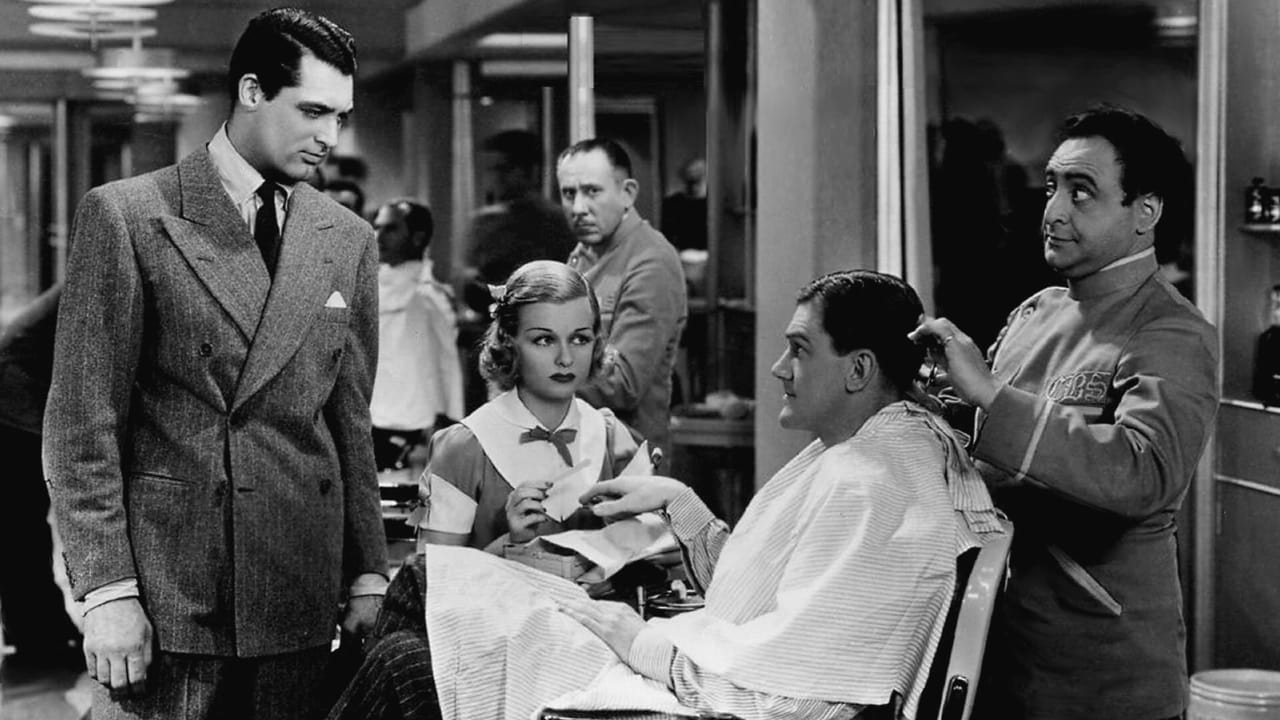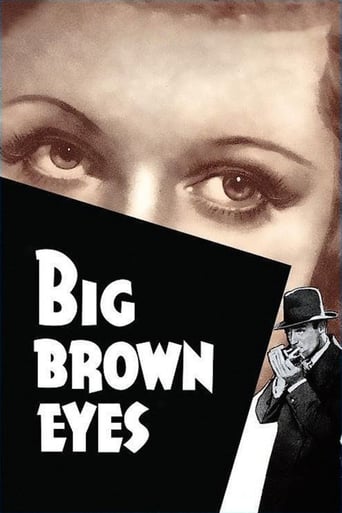HottWwjdIam
There is just so much movie here. For some it may be too much. But in the same secretly sarcastic way most telemarketers say the phrase, the title of this one is particularly apt.
Bessie Smyth
Great story, amazing characters, superb action, enthralling cinematography. Yes, this is something I am glad I spent money on.
Fleur
Actress is magnificent and exudes a hypnotic screen presence in this affecting drama.
Francene Odetta
It's simply great fun, a winsome film and an occasionally over-the-top luxury fantasy that never flags.
mark.waltz
Who would believe that a film like this with such hard-boiled and often sexual dialog (as well as a baby murder!) would have been approved by the overly censorious Hays code in the mid 1930's? I sat there stunned by the witty dialog that seemed closer to things that Mae West or Jean Harlow might have said to Cary Grant three years before than Joan Bennett did to him here. The result is one of the most delightful surprises and a film that is certainly worthy of re-visiting just to catch everything each of them says to each other in this delightful screwball comedy with a touch of social relevance tossed in.Yes, Cary Grant plays a cop here, and Joan Bennett seems to go from every occupation from waitress to reporter to manicurist in less than 90 minutes. She's so hard boiled that it is surprising that Grant is able to crack her shell. The film surrounds a series of jewel robberies (a plot favorite in the 1930's), and in order to catch a thief, Grant utilizes Bennett's position on a big New York city paper that seems to focus more on scandals than detailing world news. Bennett, obviously in love with him, is jealous of his connection with robbery victim Marjorie Gateson, and obviously for no reason. Walter Pidgeon is a private investigator involved in trying to get to the bottom of the robberies, so it is no surprise when it turns out that he is involved! There's also Lloyd Nolan as a gangster whose shoot-out with fellow gangsters ends up with an innocent baby being killed in Central Park.Bennett helps crack the case by getting one of the witnesses to crack in fear of his own life. Her way of doing this is ingenious, and I will not spoil that by revealing it here. Let me just say it is brilliant. If the murder of the baby isn't shocking enough, then there's the trial of the accused and the inevitable betrayal of each gangster from the other, indicating that these criminals are fine as long as each racket is going along swimmingly, but they are the first to either point the finger at the other or wipe them out when things start to fall apart.As for that crackling screenplay, I wanted to start writing down each of Bennett's great lines, but no sooner had I started writing down the first line, she was on her third, then fourth crack, which made it impossible for me to continue that task. It's great to see these veteran stars whom many younger viewers may only remember from their later parts (in Ms. Bennett's case, either "Father of the Bride" or the TV soap "Dark Shadows"), and that deep, haunting voice of hers is a delight to behold. Grant, too, gets a lot of great retorts to each of her remarks, and their sexual chemistry is undeniable.Pre-Greer Garson leading man Walter Pidgeon is as far from Mr. Miniver or Mr. Parkington or Monsieur Curie as he can be here, a villain that seems so sure of himself that he'll never get caught. Marjorie Gateson is very amusing as the Billie Burke society matron and gets to recite some hysterically funny malapropisms. Why this film hasn't become better known among the screwball comedy's of this era is beyond me. This is the type of film that while not excellent is certainly worth many repeat viewings and one I wouldn't mind seeing shown as part of a big screen revival house.
secondtake
Big Brown Eyes (1936)Well, the big brown eyes that come to mind here belong to Cary Grant, who is coming into his own here. You'll recognize not only the looks (the eyes are heavier in the earlier films) but a mature attitude, the relaxed and cocky and sarcastic fellow that is so famous.The leading woman is Joan Bennett, who plays Grant's love interest. Bennett is not well known as a type the way Crawford or other women from her period are, and it's partly because she plays a kind of generic character, in this case a blond, sweet, smart, fun woman. She actually became more famous later in a couple Fritz Lang dramas (as a brunette), also playing a type. what she had going for her was a natural and fluid ease before the camera. And an ability to fit a part, not steal the show.Because the show belongs to Grant. And Grant here is a cop, Danny Barr. He tends to insert his casual confidence and slow ease as a cop and it's actually a pretty interesting fit, not at all the stereotype created by harder boiled types, or more witty ones (name a half a dozen famous ones). It's fascinating to watch him at this pivotal point in his career. It's usually pointed out that Grant's persona solidified in 1937 in "The Awful Truth" but having watched most of these films from this period it really seems that he's fully himself here, a year earlier. History is right in the sense that "The Awful Truth" pushed Grant's career up a notch simply because it's a better movie. And he has a more prominent role in it.Here, the action is spread between Grant and his cops, Bennett and her life bouncing from being a manicurist to a reporter, and the "bad guys" who are up to their usual no good. These thugs are actually pretty convincing, falling short of the hardened awful types of some movies. One of them (the kingpin) is a young Walter Pidgeon, who is not quite right in his role, but it's fun to see him so early in his career. "Big Brown Eyes" is poorly name, but besides that it's not a bad movie at all, and if you follow the several plot lines (all connected) it gets pretty interesting. Every now and then when the plot is sped up (thankfully) the camera shows a whole range of characters close up and at a tilt. It's both affected (a little at odds with the rest of the movie) and successful (at speeding up the plot with appropriate humor and agitation). There are some fun twists (like when Bennett accidentally makes a fingerprint dusting using some talcum powder. And there are lots of turns, people quitting jobs and leaving town, and some odd shocks, as when the baby is killed.In the end it's also a romance with Grant in the lead role, well done and sharply acted. See it.
MartinHafer
Mega-stardom for Cary Grant still was ahead of him when he made this amiable romantic mystery with Joan Bennett, though the film is still well worth watching and is one of the better films in this era. By 1937-1939 he was pretty much a household name, with films such as THE AWFUL TRUTH, HOLIDAY and GUNGA DIN to his credit (BRINGING UP BABY was perhaps the best of the films of this time period, but in 1938 it was a financial flop).As for Joan, though much of the film I thought she was her sister Constance, as Joan died her hair platinum blonde for the film and she's best known as a raven-haired actress. It's amazing how much alike they look given the same hair styles. She, too, had better and more popular films in the future and so this film is one from both their transitional periods--clearly they were stars, but not of the first order.The film is a wonderful blend of comedy, romance and mystery and is one of the better examples of this odd genre combination. While it isn't up to the tip-top standards of THE THIN MAN (but what was?), it was certainly a very good film. What I liked best was the writing for Joan's character. She was a wonderful 'broad'--a worldly and wise lady who had some of the best one-liners I've ever heard in a film of the era. She was enticing AND mouthy at the same time--whatta dame! The mystery involves an evil private detective (Walter Pidgeon) who is not above a lot of larceny in order to make it in his racket. Not only does he find stolen items, but he's not above having others killed or dealing with crooks to get it. During most of the film, Grant plays a police detective (an odd casting decision, I know) who is in love with Joan AND is assigned to a case involving Pidgeon--though at this point, no one knows he's "Mr. Big" behind everything evil and corrupt Grant is investigating. Throughout the investigation, Joan in the role of a reporter, does amazingly well in helping her boyfriend and even though they snipe at each other a bit, they are a great screen couple.Overall, a delightful film that is close to earning an 8. Very well written and surprisingly good for an earlier Grant film.
JohnHowardReid
It's not hard to figure out why this one is a firm favorite with cultists on the one hand and yet is despised by critics and the general picturegoing public on the other. A picture that makes a glamor hero of a brutal baby-killer is not likely to win many friends except among the corduroy set. Nor is its sassy heroine who twists the law into her own brittle hands and easily outshines the nominal hero in righting wrongs going to be adopted as idol-of-the-month by the Bible belt (despite a number of Biblical precedents).This said, however, for those of us who like to see and even more especially to hear Joan Bennett brilliantly outclass rushing hither-and-thither Cary Grant and debonair detective-about-town Walter Pidgeon, "Big Brown Eyes" (I assume the title refers to Joan) is a must.Also to be reckoned with are Lloyd Nolan who manages to pull off an extremely difficult role, and Douglas Fowley giving the best performance of his career. If you don't literally jump out of your seat like I did during the scene in which Fowley exits the friendly police station, you shouldn't be watching vintage movies.Raoul Walsh has directed all the proceedings here with admirable style, polish and economy. Production values are absolutely first class.


